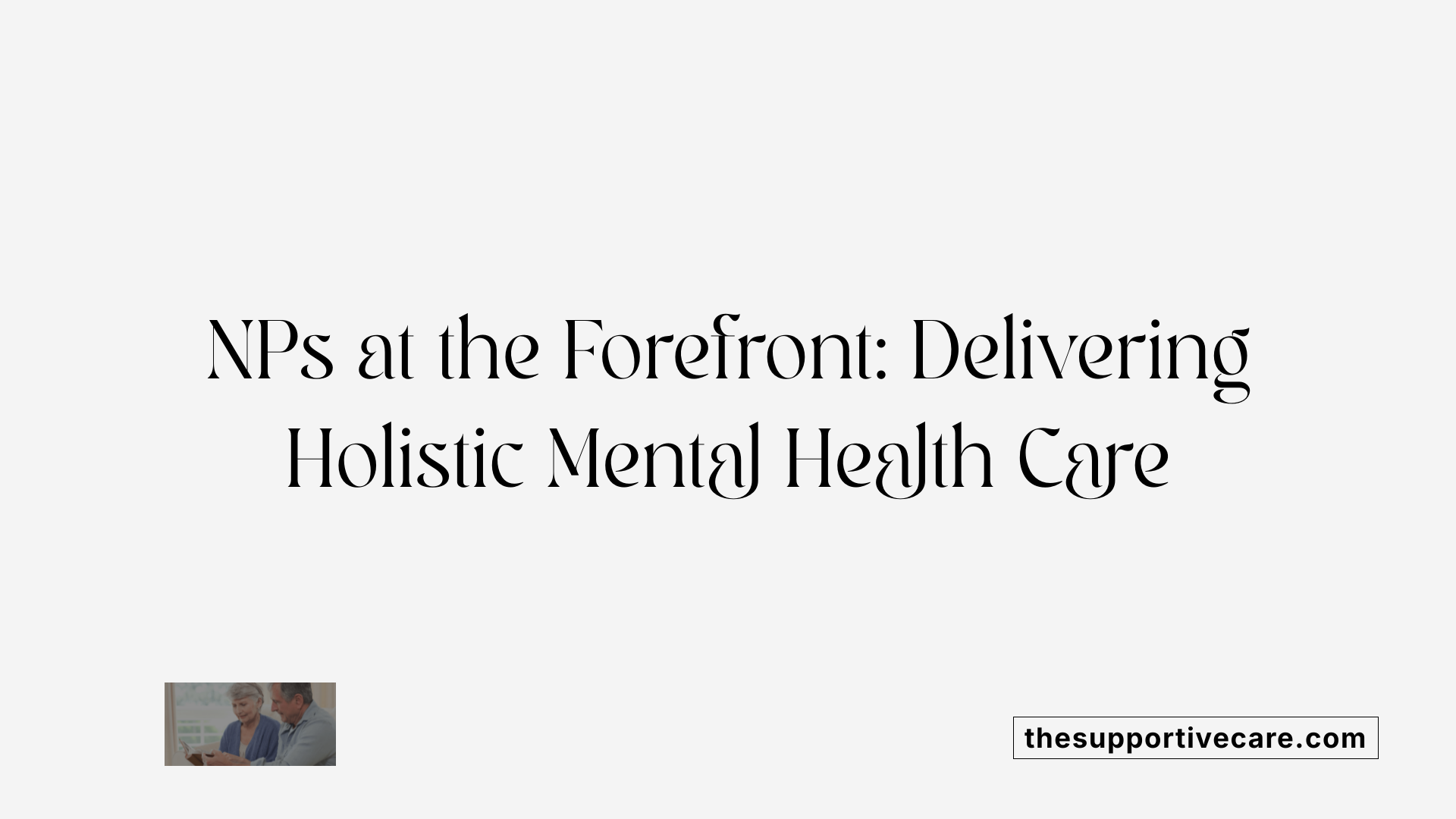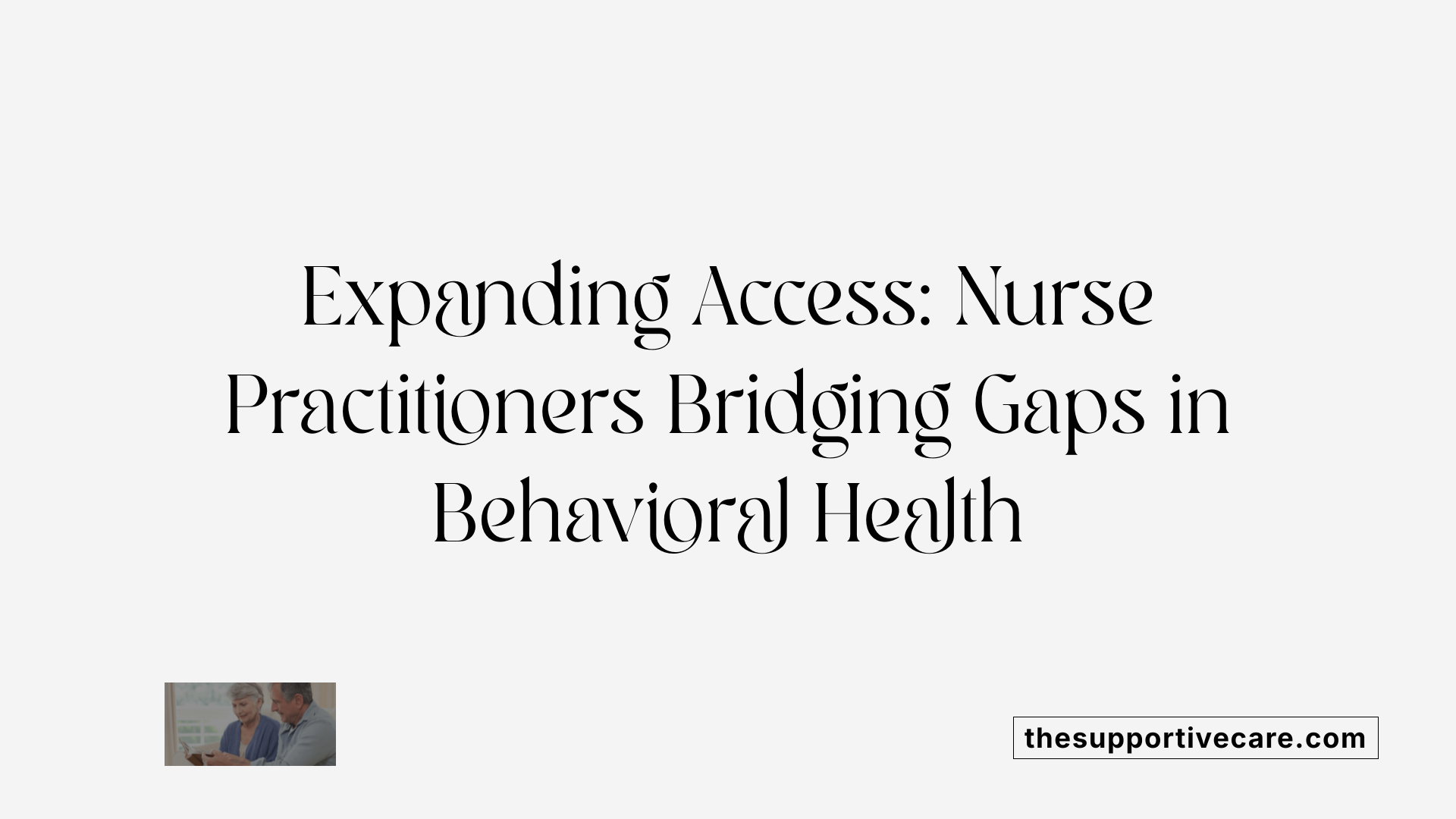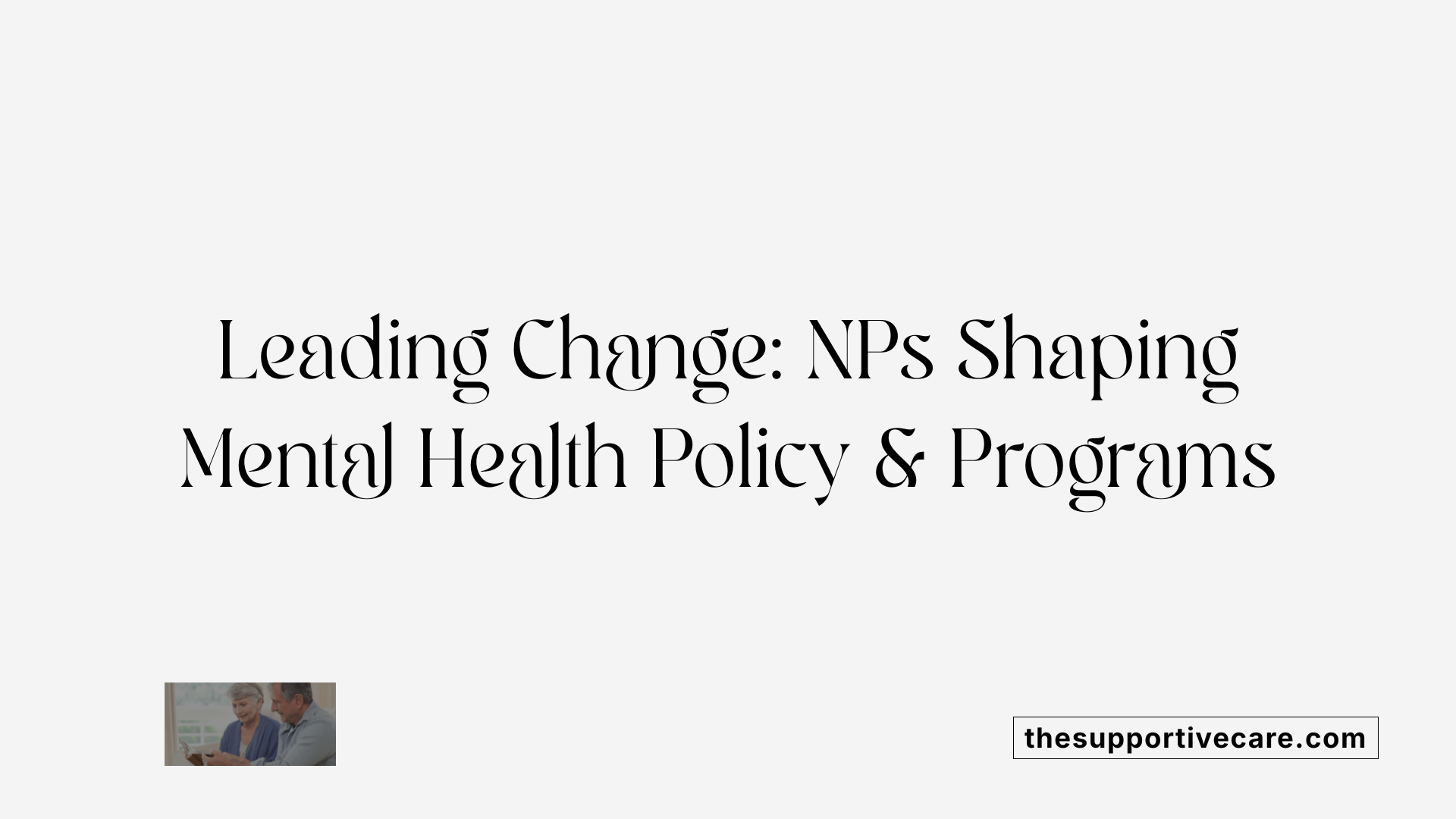Addressing the Mental Health Crisis Through Nursing Leadership
The increasing demand for behavioral health services amid workforce shortages necessitates innovative solutions. Nurse practitioners (NPs), especially psychiatric-mental health nurse practitioners (PMHNPs), have emerged as pivotal figures in bridging gaps in mental health care. This article explores how NPs enhance service accessibility, improve patient outcomes, and influence health policy, ultimately transforming behavioral health services across diverse settings.
The Critical Role of Nurse Practitioners in Behavioral Health Care

What is the role of nurse practitioners in behavioral health care?
Nurse practitioners, especially psychiatric-mental health nurse practitioners (PMHNPs), are vital in bridging the gaps in mental health services. They deliver a wide range of care, including diagnosing and treating mental health conditions, prescribing medications, and providing therapy. Their ability to assess patients comprehensively allows them to develop personalized treatment plans that cater to individual needs.
PMHNPs work across many healthcare environments—primary care clinics, hospitals, schools, and through telehealth platforms—making mental health care more accessible. They collaborate with other healthcare providers to ensure integrated, holistic treatment, which improves outcomes for patients of all ages, especially those in underserved or rural areas.
How do nurse practitioners contribute to diagnosis and treatment of mental health disorders?
Nurse practitioners are trained to conduct mental health assessments, diagnose various psychiatric conditions, and deliver therapeutic intervention. Their education includes advanced skills in counseling, crisis intervention, and medication management. This enables them to treat conditions such as depression, anxiety, bipolar disorder, and substance use disorders effectively.
In primary care settings, PMHNPs are instrumental in early detection and prevention, helping to identify mental health issues before they escalate. Their holistic approach ensures that physical health comorbidities are managed alongside mental health, facilitating comprehensive patient care.
What is the prescription management role of nurse practitioners?
PMHNPs are authorized to prescribe psychotropic medications, providing a critical service in areas with shortages of psychiatrists. They monitor medication efficacy, side effects, and interactions, adjusting treatments as needed to optimize patient well-being.
Their ability to prescribe enhances treatment access, especially in rural and underserved areas, and reduces barriers to effective medication management. This role is supported by credentialing standards and continuing education, ensuring safe and effective medication use.
How do nurse practitioners support care coordination across different healthcare settings?
Nurse practitioners excel in care coordination, working closely with primary care providers, specialists, and community organizations. They facilitate seamless communication and transfer of patient information via electronic health records (EHRs).
This coordination allows for integrated behavioral health, ensuring that mental health services are embedded into overall health management. It fosters early intervention, reduces hospital readmissions, and promotes continuous support for patients facing mental health challenges.
Which policy changes could enhance the impact of nurse practitioners in behavioral health?
Supporting full practice authority for nurse practitioners would enable them to operate independently, expanding access especially in resource-limited settings. Removing practice restrictions and simplifying billing procedures could significantly increase their contribution.
Encouraging policies that promote integration of behavioral health into primary care and expanding community-based training programs will further strengthen their role. Such measures can improve service reach, quality of care, and patient outcomes in mental health care.
| Aspect | Contribution | Impact |
|---|---|---|
| Diagnosis & Treatment | Conduct assessments, diagnose, develop treatment plans | Early detection, tailored care |
| Prescription Management | Prescribe and monitor medications | Access to medication, optimized therapy |
| Care Coordination | Collaborate across healthcare settings | Continuity, holistic care |
| Policy & Education | Advocate for expanded roles, continuous training | Enhanced service delivery, better outcomes |
Nurses' expanding role in behavioral health care offers promising pathways to address current shortages, improve access, and deliver holistic, patient-centered mental health services.
Enhancing Access to Behavioral Health Services in Underserved Areas

How do nurse practitioners improve access to behavioral health services?
Nurse practitioners, especially those specialized as psychiatric-mental health nurse practitioners (PMHNPs), play a vital role in expanding behavioral health care access. They provide comprehensive mental health services across different environments like primary care clinics, schools, community centers, and rural health settings.
PMHNPs are qualified to deliver therapy, prescribe medications, and offer preventive mental health interventions. This versatility is crucial in addressing the dire shortages of mental health providers—particularly for children, adolescents, and adults in underserved and rural areas.
Removing legal restrictions on practice scope and increasing support for full practice authority allows nurse practitioners to serve more patients efficiently. When integrated into primary care, PMHNPs help identify mental health conditions early, initiate treatment, and monitor progress, leading to better patient outcomes.
Models incorporating nurse practitioners have demonstrated improvements in patient well-being by reducing symptoms of depression and anxiety. They also improve access, shorten wait times, and deliver care closer to home, especially where psychiatrists and mental health specialists are scarce.
To maximize their impact, strategic investments in workforce development—such as specialized training, policy reforms, and community-based practice partnerships—are essential. These steps enable NPs to address mental health gaps more effectively and support a more equitable mental health system.
How do workforce shortages affect mental health service delivery?
Workforce shortages remain a major challenge, especially in rural and underserved communities. Data shows most rural health areas lack Medicare-credentialed psychiatrists or PMHNPs. However, the number of rural health service areas with only PMHNPs has increased significantly from 2013 to 2019, illustrating their growing importance in filling treatment gaps.
Training programs and clinical internships are increasingly including community-based, integrated behavioral health experiences. These efforts prepare NPs to deliver high-quality care tailored to underserved populations.
How can expanding practice authority benefit mental health care?
Allowing nurse practitioners to practice fully without restrictive regulations enables them to assess, diagnose, and treat mental health conditions independently. It enhances their ability to integrate into primary care settings, foster team-based care models, and expand service capacity.
This expansion not only improves access but also reduces healthcare costs by providing cost-effective, high-quality mental health services. Current billing trends indicate a steady increase in Medicare claims by PMHNPs—estimated at 1-3% annually—highlighting their growing role.
In summary, empowering nurse practitioners through policy changes, education, and practice integration is fundamental to closing mental health care gaps, especially in resource-poor regions. Their expertise, combined with supportive regulations, can significantly improve behavioral health outcomes for vulnerable populations.
Contributing to Mental Health Workforce Capacity
Nurse practitioners, especially psychiatric mental health nurse practitioners (PMHNPs), play an essential role in expanding the mental health workforce, particularly in underserved communities. Over the years, the number of PMHNPs has surged significantly; between 2013 and 2019, their numbers increased by 134.1%, far outpacing the 14.9% growth among psychiatrists. This rapid expansion helps address the stark shortages of mental health providers, especially in rural areas where access to psychiatric specialists is limited.
PMHNPs are highly trained to assess, diagnose, and manage mental health conditions, including prescribing medications. Their ability to deliver comprehensive care helps fill the gaps created by the uneven distribution of psychiatrists. In fact, many rural health service areas have no Medicare-credentialed psychiatrists or PMHNPs, yet the presence of PMHNPs is steadily increasing in these regions.
Their expanding role is critical because the demand for mental health services continues to grow, driven further by challenges like the COVID-19 pandemic. During this period, NPs have provided vital support across various healthcare settings, including telehealth, mobile testing, and community clinics.
Regional disparities highlight the importance of PMHNPs. As the number of rural health service areas with only PMHNPs increased, it underscores their importance in delivering care where psychiatrists are scarce or unavailable.
Supporting policies that grant full practice authority to NPs and integrating them into primary care systems can further enhance their impact. These changes allow PMHNPs to operate at full scope, offering early intervention, ongoing treatment, and preventive services. Such policies are crucial to strengthening the mental health workforce, reducing disparities, and ensuring that more individuals receive timely, effective care.
Table: Growth and Impact of PMHNPs in the U.S.
| Year | Number of PMHNPs | Increase % | Role in Rural Areas | Contribution to Access |
|---|---|---|---|---|
| 2013 | Data Not Provided | - | Limited | Major in underserved communities |
| 2019 | Significantly increased (up 134.1%) | 134.1% | Growing presence | Key providers in behavioral health |
| 2021 | Continued growth estimated at 1-3% annually | Projected increase | Expanding role | Improving access in resource-limited areas |
With a focused effort to support full practice authority and expand education, the NLP workforce can further alleviate provider shortages. This will lead to better health outcomes, especially for populations in rural and underserved regions where mental health needs are often unmet.
More information on supporting the mental health workforce can be found by searching "Nurse practitioners contribution to mental health workforce."
Increasing the number and scope of PMHNPs not only expands the capacity of mental health services but also promotes a more equitable distribution of care, ensuring that everyone, regardless of their location, has access to essential mental health support.
Policy Implications and Support for Nurse Practitioners in Mental Health
What are the policy implications of nurse practitioners' roles in behavioral health?
The expanding involvement of nurse practitioners, especially psychiatric-mental health nurse practitioners (PMHNPs), highlights several critical policy considerations necessary for bolstering mental health care. As the demand for mental health services surges—particularly during periods like the COVID-19 pandemic—policy reforms are vital to optimize the contributions of NPs.
One of the most significant policy areas is practice authority. Granting full practice authority to Advanced Practice Registered Nurses (APRNs), including PMHNPs, allows them to independently evaluate, diagnose, prescribe medications, and manage mental health conditions. This autonomy is especially important in underserved and rural regions where psychiatrist shortages are profound; data shows a 134.1% increase in PMHNPs from 2013 to 2019 and a concurrent decline in psychiatrist availability.
Reimbursement and billing policies are another crucial aspect. Current frameworks often limit how NPs can bill for services, sometimes restricting billing to collaborative or supervised settings. Adjusting these policies to fully recognize and reimburse NP-led mental health care can incentivize more practitioners to serve in these roles. Notably, the growth of billing Medicare for PMHNP services—estimated at an annual increase of 1-3%—demonstrates an evolving recognition of their importance, but further policy support is needed.
Involving NPs in policy development is essential for creating sustainable models of care. Integrating PMHNPs into community-based and pediatric health programs through supportive policies could enhance early detection of mental health issues, improve treatment adherence, and reduce disparities. As these providers are trained to deliver holistic, patient-centered, and cost-effective care, policies must facilitate their ability to innovate and operate across diverse healthcare settings.
Overall, strategic policy reforms—such as expanding practice authority, refining reimbursement structures, and actively involving NPs in mental health policy discussions—are fundamental to addressing workforce shortages and improving mental health outcomes nationwide. Fully harnessing the skills of nurse practitioners offers a promising pathway to bridging the widening gap in mental health care access.
Nurse Practitioners' Involvement in Policy and Leadership
 Nurse practitioners, especially those specialized in psychiatric mental health nursing, are increasingly vital in shaping mental health policies and improving community health outcomes. Their involvement spans advocacy, leadership, and practical program development aimed at expanding access to care in underserved populations.
Nurse practitioners, especially those specialized in psychiatric mental health nursing, are increasingly vital in shaping mental health policies and improving community health outcomes. Their involvement spans advocacy, leadership, and practical program development aimed at expanding access to care in underserved populations.
One of the primary ways NPs contribute is through advocacy and leadership roles. They actively push for legislative changes that permit full practice authority, removing restrictions that limit their ability to serve effectively. By participating in policy development, NPs can influence regulations to allow expanded scope of practice, which directly impacts service availability in rural and resource-limited settings.
Community-based mental health programs are also an essential area where nurses lead efforts. These programs, often embedded within schools, primary care clinics, or mobile health units, enable NPs to deliver timely mental health assessments, counseling, and crisis intervention. Their direct involvement helps tailor services to the unique needs of local populations, thus reducing barriers to care.
Research and evidence-based policies form the backbone for sustainable healthcare improvements. Nurse practitioners play a crucial role in designing and conducting research that underscores the effectiveness of NP-led mental health services. By analyzing data and outcomes, they can bolster support for policy changes, funding, and innovative care models.
Importantly, NPs can assume leadership roles at various levels—from community health initiatives to national health policy committees—ensuring that mental health services evolve to meet population needs. Their advocacy extends beyond practice borders, influencing legislation that supports integrated, accessible, and affordable mental health care.
In summary, nurse practitioners’ active participation in policy development, community programs, and research is essential for transforming mental health services. Policies that support full practice rights and strategic community initiatives allow NPs to optimize their contributions and better address the mental health crises seen across diverse populations.
Strengthening Evidence and Future Directions in Behavioral Health Nursing

What evidence supports the effectiveness of nurse practitioners in behavioral health?
Research consistently highlights the important role of nurse practitioners, especially psychiatric-mental health nurse practitioners (PMHNPs), in delivering effective behavioral health services. Multiple high-quality studies and systematic reviews show that NP-provided care achieves outcomes comparable to those of physicians. Patients treated by NPs report similar or better improvements in mental health symptoms, including reductions in depression and anxiety.
Moreover, nurse practitioners excel in providing comprehensive, evidence-based diagnosis, medication management, and psychotherapy. Their holistic approach incorporates health education and crisis intervention, which enhances patient engagement and adherence.
In underserved and rural communities, NPs are indispensable due to workforce shortages of psychiatrists and other mental health providers. Expanding the scope of practice and integrating NPs within primary care and collaborative models further improves access and outcomes.
Overall, evidence underscores that nurse practitioners are a safe, cost-effective, and high-quality component of mental health care. Their growing involvement, supported by research, helps address systemic gaps and meet the increasing demand for behavioral health services.
How do outcomes compare to physicians?
Studies indicate that nurse practitioners provide care that is equivalent in quality to that of physicians. They achieve similar patient outcomes, including symptom resolution and patient satisfaction. NPs often deliver these services at a lower cost, making them a significant resource for expanding access.
Their ability to practice independently, especially in states with full practice authority, amplifies their impact on behavioral health care access and efficiency.
What are the future roles and innovations for nurse practitioners?
The future of behavioral health nursing includes expanded assessment, diagnosis, and treatment roles for PMHNPs. Innovations such as telehealth and remote assessment will enable NPs to reach populations in remote and underserved areas.
Furthermore, integrated behavioral health models within primary care settings are expected to grow, facilitating early detection and management of mental health conditions.
Training enhancements in clinical curriculum, emphasizing interdisciplinary collaboration, cultural competence, and behavioral health screening, will prepare NPs for evolving roles.
Community-based academic-practice partnerships will continue to support education and workforce development. This combined effort aims to improve access for vulnerable groups like children, adolescents, and transitional-age youth.
In summary, with ongoing policy support, innovative practices, and expanding scope, nurse practitioners are positioned to significantly shape the future of mental health care, ensuring more accessible, effective, and integrated services for all populations.
Transforming Behavioral Health Through Nursing Innovation
As mental health care demands continue to rise, nurse practitioners stand at the forefront of delivering accessible, comprehensive, and effective behavioral health services. Leveraging their unique skill set, policy support, and expanding roles can significantly improve mental health outcomes nationwide, especially in underserved communities. Continued investment in workforce development, education, and policy reform will ensure that NPs remain a backbone of the evolving mental health landscape, closing care gaps and fostering healthier communities.
References
- Nurse Practitioners in Mental Health: Enhancing Care Access in ...
- Nurse Practitioners (NPs) Can Make a Difference in Mental Health ...
- Psychiatric Mental Health Nurse Practitioners and the Future of ...
- Enhancing Psychiatric Mental Health Nurse Practitioner Education ...
- Policy priorities to improve access to advanced practice nursing care ...
- The Benefits of Integrating Behavioral Health into Primary Care with ...
- The role of psychiatric mental health nurse practitioners in improving ...
- Policy priorities to improve access to advanced practice nursing care ...
- Psychiatric Mental Health Nurse Practitioners and the Future of ...
- The Effectiveness of Nurse Practitioner Care for Patients with Mental ...


































































































